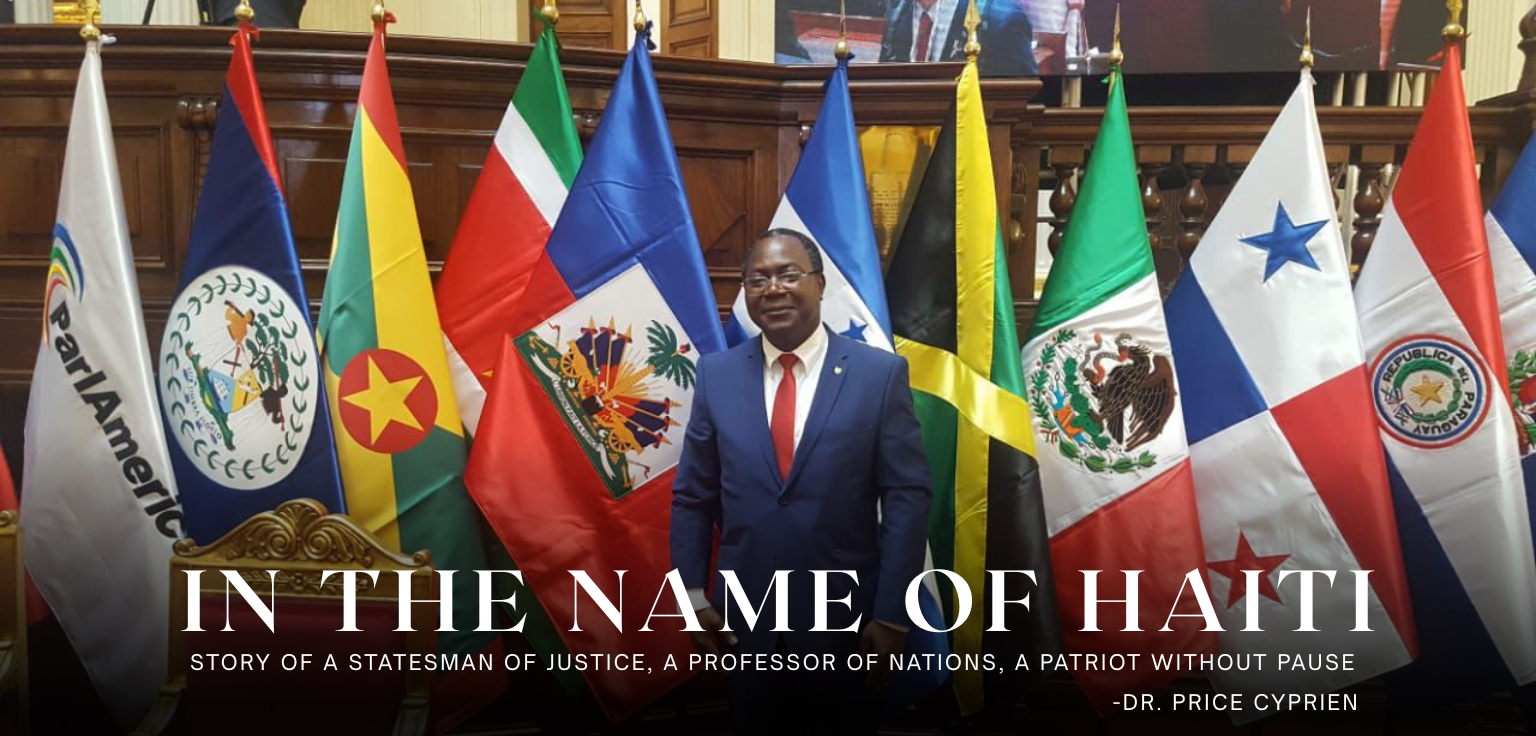
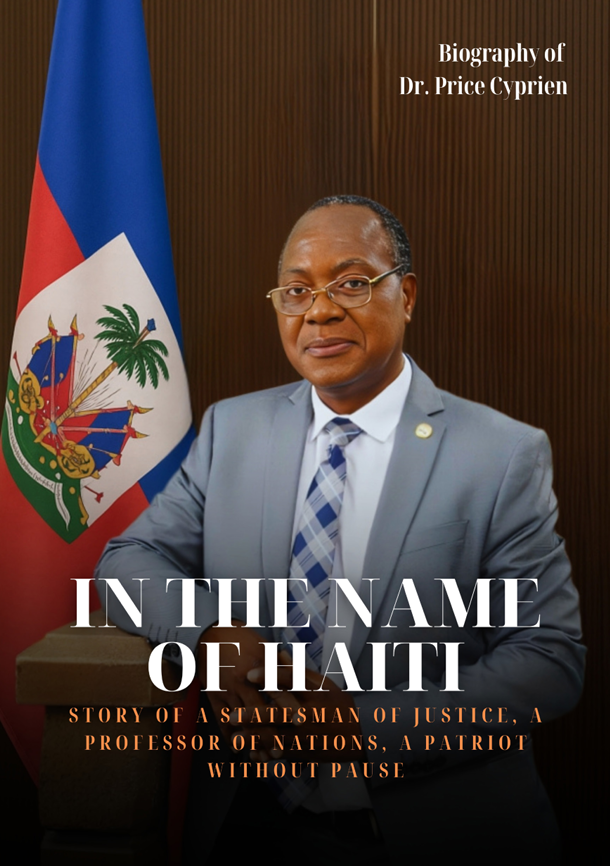
“We dared to be free, let us dare to be free by ourselves and for ourselves.” - Jean Jacques Dessalines
Dedication
“I have always believed that knowledge is the greatest form of resistance — and service, the highest expression of patriotism. To teach, to defend, to represent — this is how I have chosen to serve my country and humanity.”
— The Honourable Dr. Price Cyprien
The Honourable Dr. Price Cyprien stands as one of Haiti’s most distinguished public intellectuals and servants of the Republic. A Member of the 50th Legislature of the Haitian Parliament, he has forged a remarkable career in parliamentary diplomacy, representing his country on some of the world’s most respected multilateral platforms — from the ACP–EU Joint Parliamentary Assembly and ParlAmericas, to the Global Action of Parliamentarians and the International Parliament for Tolerance and Peace.
Elected in his first year as President of the Justice and Public Security Committee in the Chamber of Deputies, Dr. Cyprien has also held Cabinet-level positions across multiple ministries — including Justice, National Education, Planning and External Cooperation, and the Office of the Prime Minister. His reach, however, extends far beyond politics.
For over three decades, he has served in Haiti’s intellectual frontlines — as a Professor of Law, Vice-Dean at INAGHEI, and later Vice-Rector for Academic Affairs during the State University of Haiti’s pivotal reform era. As a Professor Emeritus, his influence echoes in the minds of generations of Haitian students.
Trained in law, political science, and international relations at esteemed institutions in France — the University of Picardie Jules Verne, Grenoble Alpes University, and the Center for Diplomatic and Strategic Studies in Paris — he combines scholarly depth with strategic foresight.
A lawyer by profession and visionary by vocation, he now co-leads the international law firm Cyprien Wakam & Associés, continuing to shape justice not only in courtrooms, but in classrooms, parliaments, and public consciousness.
His diplomatic missions have taken him to over 30 countries across Africa, Europe, the Caribbean, and the Americas — a tireless advocate for equity, democracy, and Haitian dignity on the global stage.
Phase 1: Story of the Roots of Life
“I was born in a place where the soil remembers the footsteps of the just. My earliest lessons were not taught—they were lived by those who raised me. From them, I learned that to serve is to rise.” — Dr. Price Cyprie
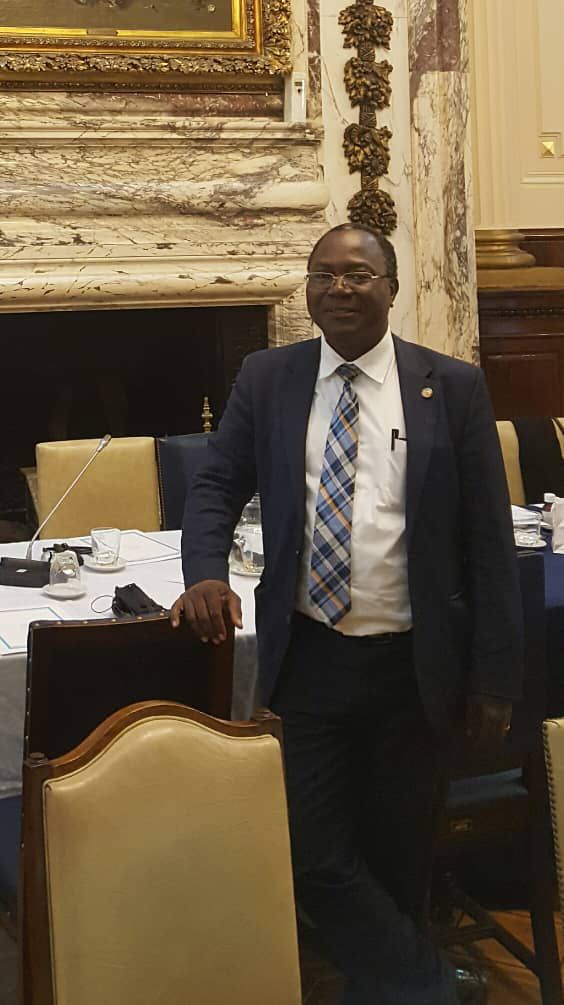
In the heart of the Caribbean, nestled along the serene expanse of Lake Azuei and beneath the embrace of Haiti’s central mountains, lies the historic commune of Thomazeau—locally pronounced Tomazo. It was here, in this land rich with the pulse of ancestral wisdom and cultural resilience, that Dr. Price Cyprien was born on March 2, 1968. His arrival in this modest yet proud town marked the beginning of a journey that would come to blend law, education, and public service in uncommon measure.
From the outset, Dr. Price Cyprien was immersed in an atmosphere steeped in civic duty and intellectual aspiration. His family was not merely part of the local community—they were pillars of it.
His father, Jussieu Cyprien, a formidable and deeply respected statesman, dedicated more than four decades of his life as the Mayor of Thomazeau. His political longevity was not a product of circumstance, but of character—an unwavering commitment to the common good, earned trust, and an abiding love for his people. Beyond municipal governance, he held a distinguished position as a political advisor to the President of Haiti, shaping national policies while never forgetting the humble commune that raised him. His passing in 2020 left a profound void not only in the family but in the civic life of the region, where his influence remains a living legacy.
Dr. Price Cyprien’s mother, Marie Antoinette Douze Cyprien, by contrast, governed the realm of education and nurturance with equal strength and grace. A dedicated teacher by profession, she instilled in her children an unshakable respect for discipline, knowledge, and humility. While her husband shaped public discourse, she shaped minds—guiding her family with the quiet resilience that defines so many educators. Her life, though largely lived outside the spotlight, was no less monumental in its impact. Now 84 years old, having celebrated her birthday on June 13, she enjoys a well-earned retirement of more than twenty years, yet remains a living wellspring of wisdom, memory, and maternal warmth. Her enduring presence is a source of strength and reverence in the Cyprien family.
Within this dual legacy of leadership and learning, Dr. Price Cyprien found his earliest identity. From a young age, he exhibited a precocious awareness of justice and an innate desire to engage with the world through knowledge. Unlike the transient ambitions that often accompany youth, his aspirations were lucid and resolute: he longed to become a lawyer and a professor—two vocations that, for him, represented not only personal fulfilment but societal contribution. The young Price saw in the law not merely rules, but the language of fairness; in academia, not merely lectures, but the nurturing of human potential.
His convictions were not kept private. During his academic journey in France, where he pursued part of his higher education, he articulated a vision for his future that was as determined as it was selfless. In a moment that would define both personal and professional paths, he expressed his unwavering commitment to return to Haiti upon completing his studies. He spoke of building his life around the dual pursuits of legal advocacy and university teaching, and invited those closest to him to share in that journey—rooted not in convenience, but in conviction. It was an invitation shaped by principle, and accepted with admiration.
Though Dr. Price Cyprien would later rise to positions of distinction and national relevance, it is these early years that reveal the blueprint of his character. In the rural rhythms of Thomazeau, amid the intersecting legacies of political leadership and educational devotion, he was shaped not merely by circumstances, but by example. His father’s commitment to governance and his mother’s devotion to learning coalesced to produce a worldview that saw justice, service, and education not as separate callings, but as one seamless moral obligation.
Phase 2: The Academic Odyssey
“True scholarship is not the accumulation of knowledge, but the cultivation of conscience. It is the quiet courage to think beyond oneself and serve with clarity of mind and purity of purpose.” — Dr. Price Cyprie
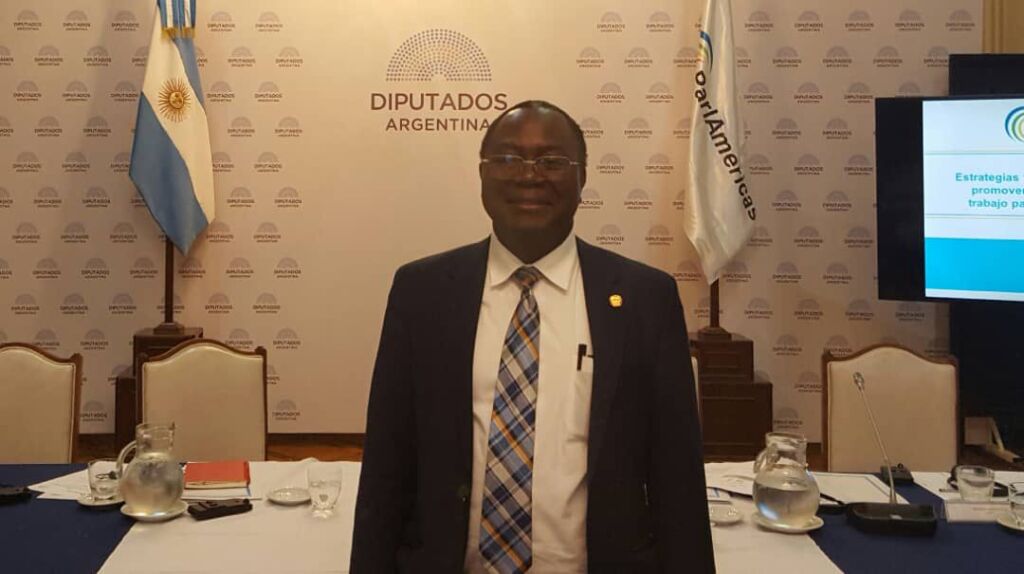
For many, the pursuit of education begins with obligation. For Dr. Price Cyprien, it began with insistence—a quiet yet firm declaration of belonging, made not by a parent or a teacher, but by a two-year-old child whose spirit refused to wait for permission to learn.
His introduction to schooling came long before the conventional age. As the youngest among his siblings, he was deeply attached to his father—a revered public figure who had long served as Mayor of Thomazeau and as advisor to the nation’s highest political office. Each day, as his elder brothers and sisters were taken to school, the toddler Price would accompany them, perched beside his father or seated alongside the family’s chauffeur. On one such morning, when the school’s teacher stepped forward to greet the older children, young Price—barely past his second birthday—followed her assertively.
“I’m staying,” he declared, when she tried to guide him back. “My brother is here. I must stay with him.”
That moment—spontaneous, simple, and sincere—would set the course of a lifelong relationship with knowledge. While most children his age were still learning to form sentences, Price was negotiating his entry into formal education with clarity and resolve. The teacher, moved by his fluency and presence of mind, allowed him to remain. Thus began his formal schooling—at the unprecedented age of two—not out of compulsion, but out of a child’s innate desire to be part of the world of learning.
Unlike many children from working households, Dr. Cyprien did not require early schooling as a form of childcare. His mother, a full-time homemaker and former teacher, along with the extended family, provided a nurturing and supportive environment. Yet his longing for the classroom, his love for the rhythm of academic life, transcended comfort. In those formative years, he embraced school with remarkable agility—learning to read, paint, and express himself with fluency and imagination. What began as a child’s insistence soon revealed itself to be the unfolding of destiny.
He remained in the same prestigious Haitian school from kindergarten through high school, a rare continuity that afforded him both stability and access to one of the nation’s most elite academic institutions. There, his intellectual versatility began to shine. He emerged as a top-ranking student in nearly every discipline—from philosophy and French literature to physics, mathematics, and chemistry. While his heart beat strongest for the humanities, and especially philosophy, he methodically mastered the sciences to ensure his position at the top of his class.
As he would later explain to his wife:
“I worked harder in the sciences so nothing would stop me from staying first. My strengths gave me identity; my effort gave me consistency.”
His academic determination was not only competitive—it was holistic. He believed that to understand the world, one must comprehend both the logic of numbers and the nuance of ideas. While many students struggled to bridge the divide between literary and analytical disciplines, Dr. Cyprien straddled both with comfort and confidence. Teachers were often astonished that a student who could quote Rousseau, Homer, and Virgil with ease could also solve complex equations in trigonometry and physical mechanics.
Yet, beyond his aptitude, it was his character as a student that left the deepest impression. He was disciplined, introspective, and driven not by pride, but by purpose. For him, knowledge was never merely a means to personal gain; it was the architecture of inner freedom.
Upon completing high school, a surprising detour shaped the next chapter of his academic path. Guided by his father’s vision that each of his sons should serve society in a distinct profession—one a doctor, another a banker, another a footballer—Price was earmarked for law and political leadership. Yet his father, inspired by a relative who had risen in Haiti’s ecclesiastical hierarchy, briefly envisioned a different path for him. Believing his son possessed the moral depth and spiritual temperament of a priest, he enrolled him in a Catholic seminary.
Phase 3: In the Service of Law and Nation
“I have never been fascinated by power. But I have always been devoted to responsibility. Public life is not a prize to be won—it is a burden to be borne with discipline, transparency, and unshakable allegiance to truth.”— Dr. Price Cyprie
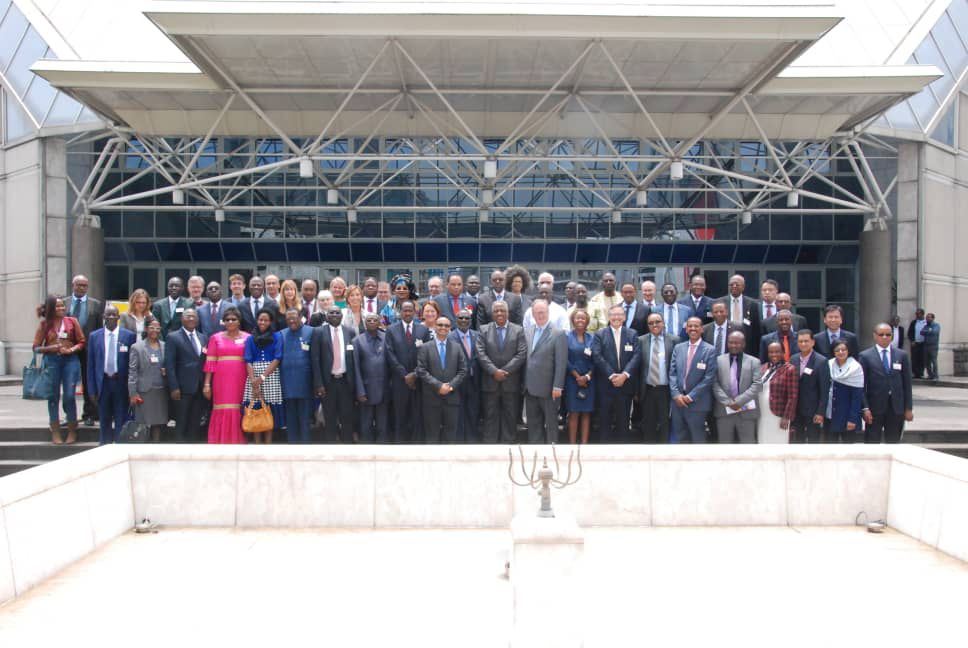
When Dr. Price Cyprien returned to Haiti in 1994, he did not step off the plane with fanfare or flourish. Instead, he returned quietly but purposefully—equipped with knowledge, determination, and a profound sense of duty to his homeland. Having completed advanced studies in law, political science, and international relations at some of France’s most respected institutions—the University of Picardie Jules Verne, Université Grenoble Alpes, and the Centre for Diplomatic and Strategic Studies in Paris—he had every reason to build a career in Europe. But Dr. Cyprien was never content with comfort. His purpose lay elsewhere: in service, in reform, and in the steady construction of a more just Haiti.
His first professional endeavor in Haiti reflected this commitment. He joined a USAID-funded program designed to provide legal assistance to citizens unable to navigate the labyrinth of the Haitian judicial system. These were the forgotten people—those without means, without advocates, and often without hope. Recruited as a coordinator by the civic organization L’Amicale des Juristes,
Dr. Cyprien quickly demonstrated his capacity for leadership. Within six months, he had begun restructuring and revitalizing the program, transforming it into a model of administrative efficiency and ethical intervention.
In an environment plagued by systemic neglect, corruption, and inertia, Dr. Cyprien brought rigor, compassion, and vision. The program not only enabled hundreds of impoverished individuals to access legal counsel and fair hearings, but also established a precedent for legal outreach initiatives in post-dictatorship Haiti. For Dr. Cyprien, this was not a job—it was a moral contract.
Yet his aspirations stretched further. While peers and family members encouraged him to remain in the administrative sector—where opportunities for financial reward were abundant—Dr. Cyprien chose instead the path of scholarship and civic pedagogy. At just 26 years old, he joined the State University of Haiti as a faculty member at the Law School, launching what would become a lifelong career in academia. Despite the institution’s limited resources and modest remuneration, he insisted that his contribution to education was non-negotiable.
“This,” he would say, “is the soul of my service.”
Over the next three decades, Dr. Cyprien would shape the intellectual contours of Haitian legal education. As a Professor at the Faculty of Law and Economic Sciences (FDSE), he mentored generations of jurists, public administrators, and legislators. His students were not merely recipients of knowledge; they were bearers of civic responsibility, a notion he emphasized relentlessly in his lectures. His classes blended rigorous legal theory with practical case analysis, drawing on Haitian constitutional history as well as comparative international law.
His stature in academia grew steadily. He was appointed Vice-Dean at the National Institute of Administration, Management, and Higher International Studies (INAGHEI) and later served as Vice Rector for Academic Affairs on the UEH Reform Commission. These roles were not ceremonial; they were foundational. As Vice Rector, he helped initiate and oversee reforms that modernized curricula, strengthened research infrastructure, and democratized access to higher education. His philosophy of education rested on two guiding principles: access and integrity.
In parallel with his academic achievements, Dr. Cyprien also built a distinguished career in public administration. Over the years, he served as a Cabinet Member across several key ministries: the Ministry of Justice, the Ministry of National Education, the Ministry of Planning and External Cooperation, and the Office of the Prime Minister. In each of these roles, he provided strategic policy guidance, facilitated institutional audits, and helped structure governance frameworks grounded in legality and efficiency. His presence in these ministries was never symbolic; it was deeply functional—allowing him to shape national policy at multiple levels of the Haitian state apparatus.